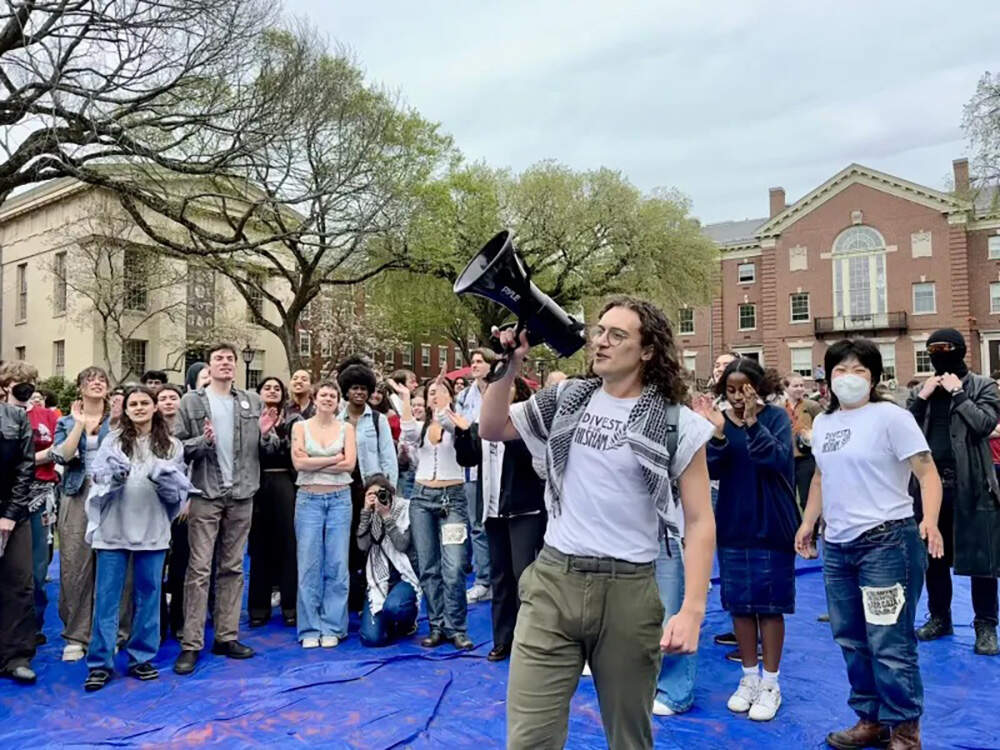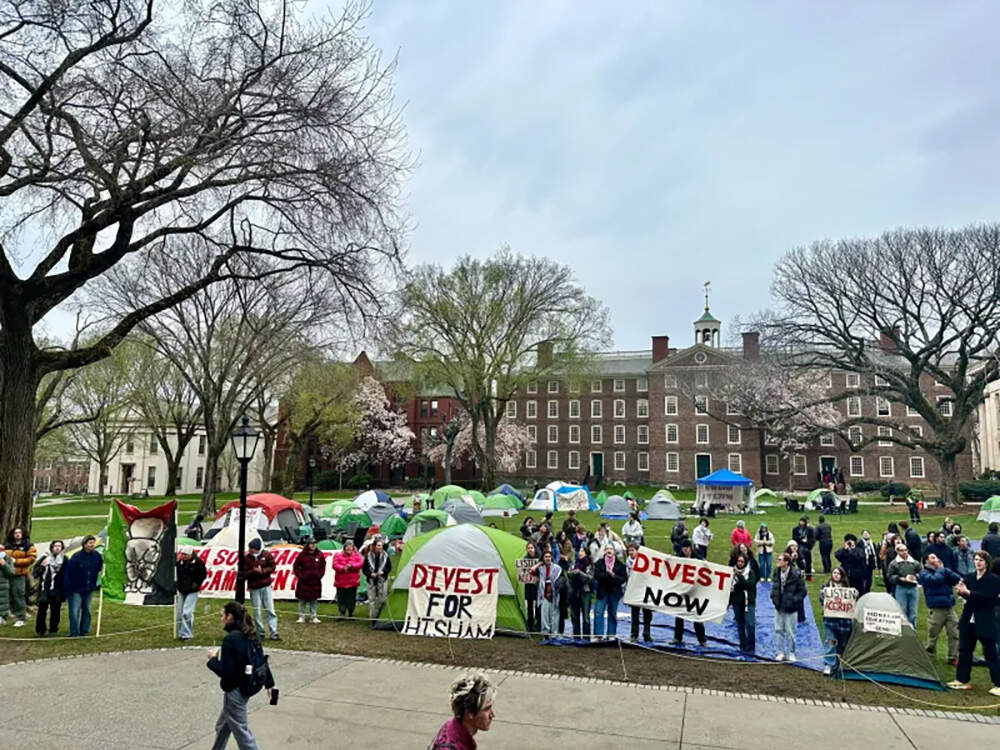Advertisement
Hisham Awartani joins Brown University students presenting divestment proposal to board members

On Thursday morning, a group of four undergraduate students and one graduate student wearing business casual attire made their way up the hill to the John D. Rockefeller library at Brown University. They had just presented a proposal on divestment to some of the school’s board members. A group of their peers, members of the pro-Palestinian organization Brown Divest Coalition, cheered them on as they approached the steps.
“Yes, yes, slay!” said one of the students.
Among the group of presenters was Hisham Awartani, a Palestinian-American-British student who was paralyzed after being shot in the spine while visiting family in Burlington, Vermont last year. The mood at the hill was celebratory, but Awartani was already focused on the next step in the process: the full university board vote on the students’ divestment measure in the fall.
“I think we should allow ourselves to have moments of joy when we feel like we’ve accomplished something like this, but at the same time, we need to temper our expectations with what is left to do,” said Awartani.
Awartani was born and raised in the West Bank to a Palestinian father and an American-British mother, and came to the U.S. to attend Brown to study math and later, archeology. Over the Thanksgiving break in Vermont, he was shot along with two other Palestinian college friends while on an evening walk. They were speaking in a mix of Arabic and English and two of them wore keffiyehs when it happened. Burlington police are continuing to investigate the incident as a hate crime, although have not yet filed hate crime charges.

Since then, Awartani has become the face of the divestment movement at Brown. Students call him a martyr in speeches. They wear t-shirts bearing the words Divest for Hisham. Awartani is a bit reserved and introverted. The day prior to the divestment presentation, he wore a t-shirt bearing an album name from experimental punk rappers Death Grips. When he speaks, he chooses precise words with care. As a Palestinian, he has given up some of his privacy for the divestment cause at Brown, and as the survivor of a possible anti-Arab hate crime, he has given up even more. The New York Times recently published an op-ed he penned.
“I think I appreciate that the evocation of my name is emotionally powerful. And I appreciate that it contributes to the momentum of this movement,” said Awartani.
The students were given the opportunity to present their divestment proposal to the Brown board of trustees as a part of a deal they struck with the administration to end their pro-Palestinian encampment last month. Since 2019, students at Brown have been asking the school’s board to divest from companies they see as facilitating human rights abuses in the Palestinian territories. That includes companies like those students say manufacture tear gas, or systems the Israeli government uses to track Palestinians’ movements. As a part of the agreement, the full board is required to present on the measure in the fall.

To pick the students who would be involved in presenting, the volunteers whittled the list down amongst themselves. They thought it was important to have a Jewish student, a student-body president, a grad student from the union representing grad students, which has been a vocal component of the pro-Palestinian movement on campus. Students also felt it crucial to include two Palestinian students. Hisham says he understands the optics of his injury contributed to him being chosen, and has expressed mixed feelings about the deference and kindness school leaders have shown him compared to people in Gaza, where over 35,000 people have been killed since October 7, 2024.
“It’s a bit disheartening that to get people to empathize, you have to be vulnerable,” said Awartani. “But I think it’s an important step to speak directly to people. And in a way that’s immediate, in their face. There’s no way they can ignore it. I hope that it had an impact,” said Awartani.
Also in the room at the Thursday presentation was a friend who has been by Awartani’s side since the two were in high school back in Ramallah. Aboud Ashhab is also a junior at Brown. Outgoing and a fast-talker, Ashhab is a counterweight to Awartani’s measured presence. And on Thursday in a light moment after the presentation to board members, his co-presenters teased him for being soaking wet. As he rushed to the meeting, the sky opened up.
Advertisement
“Right as I was walking it just starts pouring rain,” he said.
Ashhab and Awartani were roommates at Brown. And in some ways, the two had prepared their whole lives for the divestment proposal. They can finish one another’s stories about how Ashhab’s father’s colon cancer clinic in Gaza has been razed as a result of the war, how Awartani’s cousin died in the West Bank in the violence which has also increased since October 7. Aboud said being in the room presenting next to Hisham made him almost nostalgic, reflecting on what they’ve been through together.
“When it was 2021 at the Sheik Jarrah protests, we were both seniors in high school, and I remember getting tear gassed. This wasn’t some sort of crucial moment, like this is the average Palestinian experience,” said Ashhab.
Over the summer, both Ashhab and Awartani plan to remain in Rhode Island. Awartani will continue his 5-day-per-week, 2-hours-per-day regimen of physical therapy. He is also building upper body strength, he said, navigating the hills of the east side of Providence, and said his recovery is just at the beginning.
Ashhab and Awartani are also already discussing their plans for their pro-Palestinian activism in the fall. Awartani says the presentation was a major step in the process, but much work lies ahead.
“This isn’t even the beginning of the end, it’s still the beginning of the beginning,” he said.
The Public’s Radio in Rhode Island and WBUR have a partnership in which the news organizations collaborate and share stories. This story was originally published by The Public's Radio.